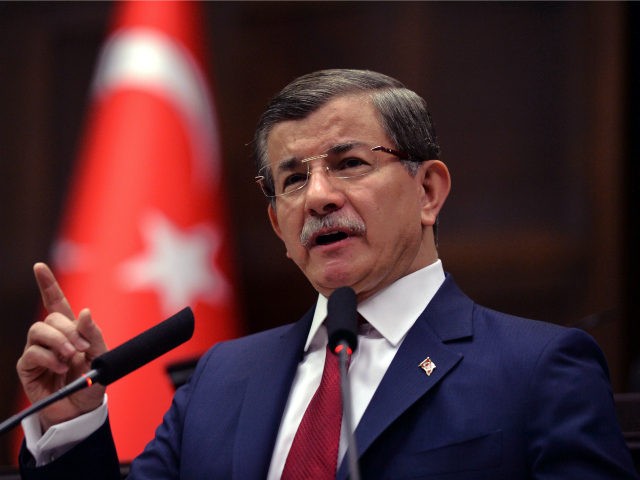Turkish Prime Minister Ahmet Davutoglu has announced that his Justice and Development Party (AKP) will be holding a congress to elect a new leader, and he will not be seeking to stay in his post.
Davutoglu said Thursday that stepping down was “not my decision,” a direct contradiction to President Recep Tayyip Erdogan’s statement on the matter, saying the congress to find a new leader was “the prime minister’s own decision,” according to Turkish newspaper Hurriyet. The Prime Minister attributed his decision to unspecified “exigencies arising” that require his departure. There is no evidence that such exigencies are of a personal nature.
Davutoglu attempted to dismiss the swarm of rumors surrounding his decision not to stay in power, declaring that “my loyalty to the president will last till the end” and asserting he would “not tolerate any speculations about my relationship with President Erdogan” to assembled reporters.
Erdogan issued a short statement to the press, reading: “I wish him well. It is the prime minister’s own decision.”
The announcement followed an hour-and-forty-minute-long meeting between Davutoglu and Erdogan on Wednesday at the Presidential Palace, which many took as a sign of growing tensions between the two leaders. In a piece confirming that Davutoglu would make such an announcement Wednesday, Reuters suggested that the main point of contention between the two men was the imposition of a presidential system in Turkey, which Erdogan supports but which would necessarily siphon from the Prime Minister’s position most of its power.
“Erdogan wants an executive presidency in Turkey to replace the current parliamentary system, a plan for which Davutoglu has offered only lukewarm support,” Reuters noted; “His departure is likely to pave the way for a successor more willing to back Erdogan’s ambition of changing the constitution and strengthening the presidency, a move opponents say will herald growing authoritarianism.” Such a move would require a new national constitution, to be approved by two-thirds of the Turkish parliament. While Erdogan’s AKP won a resounding (and, to some, suspicious) victory in the Parliament in November, he has not yet consolidated the support to make himself a full executive in a presidential system, and the debate over a new constitution has awakened debates the AKP did not intend to spark, such as whether a new constitution should be sharia-compliant.
Reuters notes that Erdogan recently stripped Davutoglu of the power to appoint regional AKP leaders. Hurriyet suggested Wednesday as well that Erdogan had begun to make veiled barbs at Davutoglu in public. In a speech Wednesday to a group of local leaders in Ankara, Erdogan warned that politicians should “not forget how you got to your post,” which was seen as a warning to Davutoglu. The latter, in turn, said Wednesday he would “turn down any position” of power if his morals decreed it.
In the same report, Hurriyet cites AKP members present at Davutoglu’s last function among them describing the meeting as “marked by ‘sadness and resentment.'”
The Turkish government will not hold nationwide elections following the announcement, presidential adviser Cemil Ertem confirmed Thursday, but the AKP will hold what is being described as an “extraordinary congress” to find a successor to Davutoglu. Reuters reported that sources within the Turkish government have floated government spokesman Numan Kurtulmus, Justice Minister Bekir Bozdag, Transport Minister Binali Yildirim, and Energy Minister Berat Albayrak — Erdogan’s son-in-law — as possible nominees. Such a congress will be scheduled for a time between May 21 and June 6, the first day of Ramadan.
Davutoglu was largely responsible for an ongoing negotiation with European Union to allow Turkish citizens to travel without visas within EU borders and to move more Syrian refugees out of Turkey and into the EU. During his speech Thursday, he emphasized that he felt “no sense of failure or regrets” and praised the Turkish government and AKP specifically for having a “will of steel” against its “jackal” opponents.

COMMENTS
Please let us know if you're having issues with commenting.